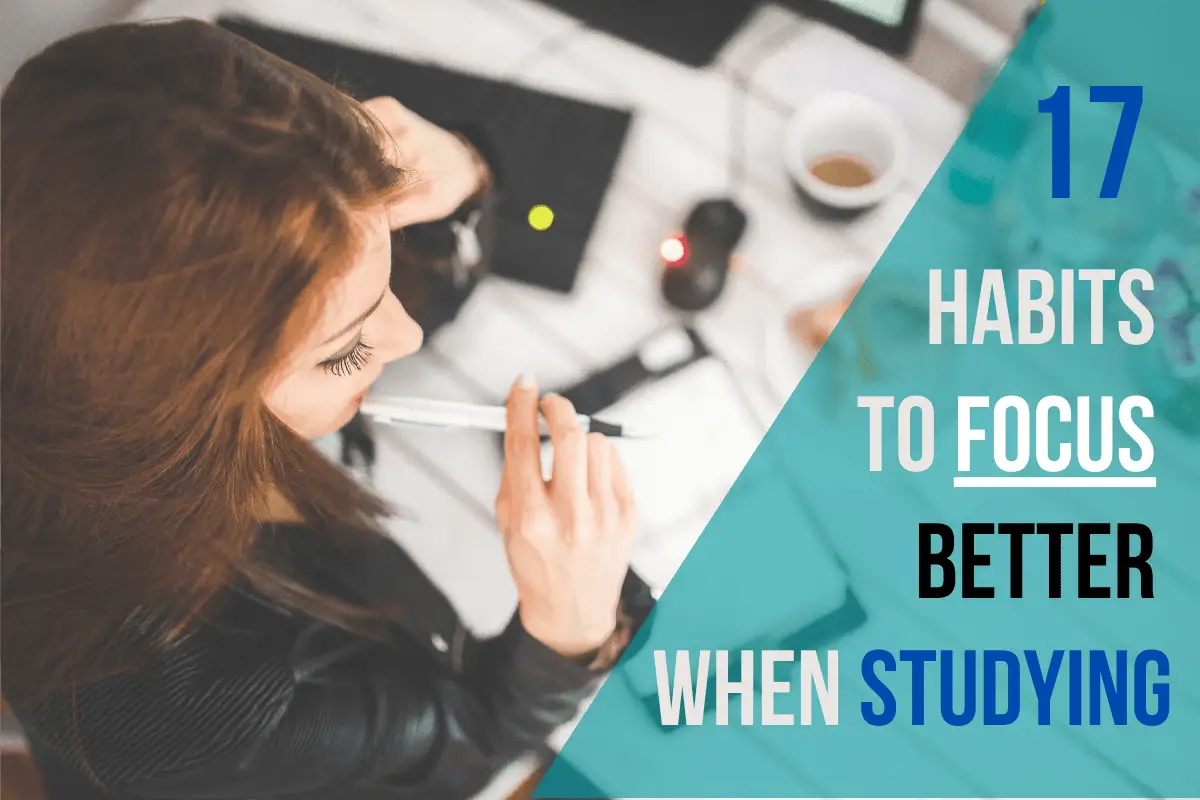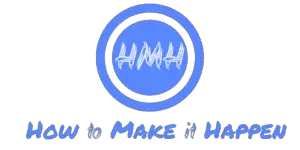Life-long learning is one of my core values. And lately, I’ve been crafting a new, crazy plan in my head…
Why not study again?
There are a few subjects that I’ve always wanted to study: psychology, architecture, medicine…
But now that I’m in my mid-thirties, I can’t help but wonder whether I’m still well able to focus and concentrate.
How to improve focus and concentration while studying? How to concentrate on study continuously for long hours, even when you’re older?
Without further due, here are the 17 habits to implement in order for ANYONE to focus better when studying.

1. Focus on ONE thing at a time.
We hear this AGAIN and AGAIN. Focus on JUST ONE THING at a time.
And I’m not even talking about multi-tasking here (though I’ll get back to this in point 6 of this post).
I’m talking about multi-committing, multi-involving, multi-DOING…
We are “DOING” too much “stuff”… so much so that we end up not doing much in the end.
One lesson that I learnt as a student was that it’s better to do JUST ONE THING, BUT RIGHT, rather than many things wrong.
I would highly recommend the following two books to those of you who have a hard time focusing on just ONE THING at a time.
I wish I had read them as a student. They would have helped me navigate better through phases of doubt and stay focused on WHAT TRULY MATTERS throughout.
The ONE Thing: The Surprisingly Simple Truth Behind Extraordinary Results* from Gary Keller:
And Essentialism: The Disciplined Pursuit of Less* from Greg McKeown:
Both books helped me out a lot when I was struggling to FOCUS on just one thing as a starting entrepreneur. And I’m confident that they could change YOUR LIFE early on, as a student.
2. Learn to say NO to additional commitments when the timeframe is unrealistic.
Once you’ve decided WHAT’s the ONE THING you are going to focus on, there’s only so much time left in your schedule for other commitments.
I found that, in the past, I had the hardest time in my life when I was not staying TRUE TO MY VALUES. And one of them is to HONOUR my COMMITMENTS.
If you’re unsure, TAKE TIME TO REFLECT. Is the timeframe REALISTIC? If you plan on skipping on SLEEP to get all the things done, IT IS NOT. SAY NO.
You can read more on the topic of “saying no” in my two other articles: How to Focus on Yourself and Not Others in 3 Steps and How to Say “NO” to Additional Work.
3. Learn to say NO to good opportunities to be able to say YES to GREAT opportunities.
That’s an important lesson I got from the book Essentialism: The Disciplined Pursuit of Less* from Greg McKeown mentioned above.
We often think we should REFUSE BAD to MEDIOCRE opportunities. But life today is such that we are often offered TONS OF GOOD OPPORTUNITIES.
It’s a luxury our brains are not used to, and it can feel really OVERWHELMING to determine which opportunities are just good and which are GREAT. But I tell you one thing: your GUTS will tell you.
If that’s not enough, then you should ask yourself the following question, as recommended by Greg McKeown:
If you DID NOT HAVE this opportunity in the first place, HOW MUCH EFFORT would you put into GETTING IT?
When something is just a good opportunity, chances are you would not be ready to give up much to obtain it if it wasn’t there already.
4. Watch out for FOMO, it’s hidden everywhere.
The Fear Of Missing Out (FOMO) is common among the newer generations. We’re constantly offered the world, but we don’t know how to best take it all in.
FOMO is what will cause you to say YES to TOO MANY OPPORTUNITIES.
You’re afraid to miss out if you don’t do a certain internship, if you don’t go to a certain event or if you don’t go out that night with your friends because you’re exhausted.
What if this internship was your ONE AND ONLY opportunity to immerse into a company or organisation?
What if this event turned out to be mind-blowing and you’d be able to meet and connect with incredible, inspiring leaders?
And what if TONIGHT IS THE NIGHT where you could have met the MAN or WOMAN of your life?
CALM DOWN. It’s all FOMO talking. You have a LONG life ahead and will have plenty of opportunities.
The only thing you need to do is PRESERVE YOUR SANITY and learn to SAY NO as mentioned above.
You can read more on this in my other article: Why Do We Feel Overwhelmed By Career Choices? What To Do About It?
5. Learn to prioritize your tasks.
The one thing I’d like you to focus on is to determine which tasks are really IMPORTANT and which ones are only URGENT (or just seem to be urgent).
Learn to filter and categorise tasks.
What consequences will it truly have if you do a certain task later? Or if you DON’T DO IT AT ALL?
And what IMPACT will this task truly have if you do it?
Once you’ve listed and categorised all of your tasks, I also want you to pick the NUMBER ONE TASK you should do soon or every day.
It’s very important to practise your PRIORITISATION SKILLS every week or so…

6. Stop multitasking.
You’ve already read so much on FOCUSING ON ONE THING.
But sometimes, you STILL feel like you are able to multitask. You study while watching a bit of TV or chatting with your friends on Facebook or WhatsApp…
STOP MULTITASKING. No matter if you are a man or a woman, we ARE NOT GOOD MULTITASKERS. And it’s a myth that you could potentially train this…
If you are tempted to multitask and find it really DIFFICULT to focus on just one thing, do this instead: try to focus for 10 or more minutes on your studies or task and THEN reward yourself with a few minutes of chatting or watching TV.
7. Use the Pomodoro technique.
There is an App I have absolutely fallen in love with and use almost every day for work.
It’s the app Focus Keeper which helps you implement the Pomodoro technique.
The Pomodoro technique is based on the same principle as what I mentioned above when trying to help you STOP MULTITASKING.
Normally, it’s recommended to FOCUS for about 25 MINUTES and then take a 5-minute break. Every 2 hours or so, you take a longer break of about 25 minutes.
That’s optimal for your BRAIN. And it also gives you a gentle reminder to RELAX between sessions, in order not to be frowning and sitting in a bad position all the time.
I also found it highly motivating for tasks that feel overwhelming or really annoying. 25 minutes are SHORT ENOUGH that you will give the first session a try.
But you can also customize the times, of course.
8. Keep a clean and tidy room.
Our brain is processing so many things subconsciously. If your room or home is dirty and messy, you will have a HARDER TIME TO FOCUS.
Make it a priority to have a GREAT environment to study in. For inspiration, you can check out the Marie Kondo method in her book The Life-Changing Magic of Tidying Up: The Japanese Art of Decluttering and Organizing*.
I also like the show on Netflix but there are also a lot of videos on YouTube.
9. Practice downsizing and minimalism.
When you are tidying up your place, make sure to filter EVERYTHING OUT that is not bringing a “SPARK” into your life, as Marie Kondo likes to say.
The stuff we are holding onto is always in the BACK OF OUR MIND. You will feel lighter and will also save money by letting go of unnecessary things and realising that a slightly more minimalist life is actually LIBERATING.
10. Turn off all of your notification sounds, visuals and vibrations.
About a year ago, I realised that my smartphone had become a SOURCE OF STRESS.
All of the notifications, be it through sound, visuals or vibrations, where NOT ONLY DISTRACTING ME but also giving me a sense of urgency.
I had the feeling that I needed to reply to everyone and react to everything right away.
What was supposed to BE A USEFUL TOOL FOR ME had become my PERSECUTOR.
I decided to turn off ALL NOTIFICATIONS and it was a great relief. Since then, my friends and family KNOW that’s the case and have gotten used to it. Many even agree that it’s an important thing to do, in order to be able to focus more on the NOW and REAL-LIFE people and experiences.
11. Hide the distracting apps on your smartphone.
Turning off all distracting notifications was a great step in the right direction.
But I went a bit further and decided to HIDE the most distracting apps on my phone.
On the first page and bottom bar, there are ONLY apps that I would like to use more or feel are harmless to me.
While really distracting apps are on the next page and even hidden in an APP GROUP.

12. Use a website blocker for social media and Netflix.
We all have one or several addictive platforms that are often distracting us from learning OR socialising.
If you find it too hard TO RESIST, install a website blocker and set a timeframe during which it is OK for you to watch a movie or go on social media.
I’ve used this in the past, though I must admit that I normally am quite happy with my self-control at the moment so that I’ve not been using a website blocker for a while now.
But I didn’t want to leave you hanging here, so after having done a quick research, I’d probably recommend trying out FocusMe. It seems to have good reviews and be a good one to start with.
Let me know what you think if you happen to try it out!
13. Keep an overview of your monthly tasks and learning goals.
It’s easy to get lost as a student. There’s many classes, things to learn and activities to do.
Very often, the LAST TASK mentioned by a professor will be the one we focus on. Because we are biased and what we’ve heard last is MORE VIVID in our memory.
That’s why it’s always important to keep an overview of your MONTHLY TASKS and LEARNING GOALS.
It should include both tasks that are REQUIRED as well as TASKS THAT YOU KNOW ARE IMPORTANT TO BE A SUCCESSFUL STUDENT, such as reviewing your notes regularly.
14. Always keep your calendar up-to-date and at sight.
In order to STAY REALISTIC and plan your tasks ahead for the month the best you can, it’s really important to KEEP YOUR CALENDAR UP-TO-DATE and at sight.
In the past, I helped my younger brother get his grades back up when he was in high school.
The first thing I did was to ask him what his EXAM and task SCHEDULE was. From there on, it was EASY to plan at least two or three weeks ahead. I could tell him what he should be focusing on and BITE-SIZE everything.
His grades quickly went up!
15. Always prepare your to-do list the day before.
There’s nothing HARDER FOR ME, personally than waking up and having to figure out what I need to do today.
Everything seems to FLOW, however, when I’ve planned my day the night before.
I’ve written a more extensive article on to-do lists and the best practices I would recommend. So if you’re interested in this, read it: Too many To-Do Lists: How Does this Happen & What to Do?
16. Start with the most difficult or important task in your most productive time zone.
And your most productive time of the day is MOST LIKELY the morning.
But sometimes as a student, it’s really hard to start learning right away in the morning.
That’s okay. Just observe yourself and try to figure out which time works the BEST for your IMPORTANT or DIFFICULT assignments or tasks.
Be sure to SQUEEZE the number one task of your daily to-do list into this timeframe.
17. Listen to audiobooks while you walk, go to the gym or do the chores.
Listening to audiobooks is a GREAT WAY to train your FOCUS and CONCENTRATION further while learning new things at the same time…
“Whaaaat? I thought I wasn’t supposed to multitask?”
Sure, but SOME TASKS that you’ve been doing FOREVER are now on autopilot. If you have a specific routine, it’s very likely you can listen to AUDIOBOOKS or to your own study recordings at the same time.
I enjoy audiobooks a lot during my walks outside or when I do boring chores like the laundry.
But even then, I’ve noticed that it’s hard for me to ACTIVELY listen to my audiobooks WHEN I am in a NEW ENVIRONMENT. If I take a walk in a new city or neighbourhood, there are so many NEW things to see that I can’t focus on the audio at the same time.
Pay attention to this and ONLY “multitask” when there is ONLY ONE TASK you need to be actively focusing. All the others should run on AUTOPILOT.
I also recommend you listen to a healthy mix of audiobooks. Don’t ONLY listen to novels OR only to complex books. It’s your free time, balance pleasure and education.





